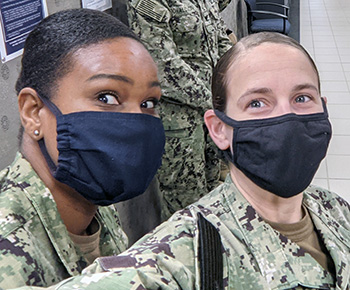Corpsman Up! – Navy ‘doc’ reiterates importance of blood donations
 Hospital corpsman 2nd Class Ashley Thompson donates blood again at the Akeroyd Blood Donor Center at Joint Base San Antonio-Fort Sam Houston in Texas. (Courtesy of HM2 Ashley Thompson.)
Hospital corpsman 2nd Class Ashley Thompson donates blood again at the Akeroyd Blood Donor Center at Joint Base San Antonio-Fort Sam Houston in Texas. (Courtesy of HM2 Ashley Thompson.)
ASBP is the military’s only blood donor program for service members, their families, retirees, veterans, and local communities worldwide, helping those in critical need. Both whole blood and COVID-19 Convalescent Plasma (CCP) from those who have recovered from COVID-19 remain in high demand. All 21 donor centers adhere to CDC guidelines to reduce the spread of COVID-19.
Navy Hospital Corpsman 2nd Class Ashley Thompson not only advocates for the Armed Services Blood Program on a regular basis, she also participates whenever she can.
As ‘A’ school instructor at Navy Medical Training Support Command’ Hospital Corpsman School, the Navesink, New Jersey-native’s primary role is to teach initial entry or fleet returnee students. This allows for mission readiness and medical readiness across the Navy and Marine Corps fleet.
In addition to her primary duties, the 10-year Navy veteran also serves as the school’s blood drive liaison set up as many blood drives as possible for the Akeroyd Blood Donor Center at Joint Base San Antonio-Fort Sam Houston in Texas.
“She also provides education on the importance of our program to them, added Army Sgt. First Class Margaret Strecker, Akeroyd Blood Donor Center’s noncommissioned officer in charge. “She has also organized targeted blood drives with Navy Medical Training Support.”
For Thompson, donating is personal, “My Dad has donated blood for as long as I could remember, and I always went with him. I wanted to donate as soon as I was old enough. It took me to just shy of my 30th birthday to donate, and I have never looked back. Sometimes I am unable to donate for one reason or another, but once my deferral period is over, I go right back to screen and donate!”
Getting new sailors to understand the blood donation process and the importance comes easily to this corpsman, “I explain why blood donation is so important, and how quickly it can be done,” impressed Thompson. “That they can keep donating over the years and help save countless lives.”
 Hospital Corpsman 2nd Class Ashley Thompson (right) and Hospital Corpsman 2nd Class Irena Gadegbeku pose for a photo during the COVID-19 era. (Courtesy of HM2 Ashley Thompson.)
Hospital Corpsman 2nd Class Ashley Thompson (right) and Hospital Corpsman 2nd Class Irena Gadegbeku pose for a photo during the COVID-19 era. (Courtesy of HM2 Ashley Thompson.)
Donating blood remains very safe, even during the COVID-19 era, according to Strecker. “The need for blood is always there. We have all taken special precautions to ensure donors feel safe and comfortable while in our building.”
“Find your local blood donation center, get a few friends together and go donate! If you have never donated before, find out if you CAN donate, and donate at least once,” advised Thompson, who’s donated at least nine times in her military career. “If you can donate more, keep going! Saving lives one donation at a time is something you can hold onto forever. If you cannot donate for any reason, spread the word to others who can! It all makes an impact.”
“The need for blood never goes away, added Strecker. “There is not a synthetic replacement for blood, and the only way to receive it is through volunteer donors.”
The ASBP is a tri-Service organization, meaning there are Navy, Air Force and Army donor centers supporting all our Services, collecting whole blood and plasma at locations all over the world.
These blood products support contingency operations, military medical treatment facilities, and Veterans Administration medical centers across the globe. Strecker added, “It is important for our donors to know that when they donate with us they are saving the life a fellow service member, family member, or veteran.”
“I am a United States Navy Hospital corpsman, my job is to help others and save lives,” expounded Thompson, “So this is just another way I can do that, for those who was in desperate need of blood.”
To learn more about donating blood to our Soldiers, Sailors, Airmen and Marines check out the Armed Service Blood Program webpage, and to find out if there is a blood donor center near you, check their maps.